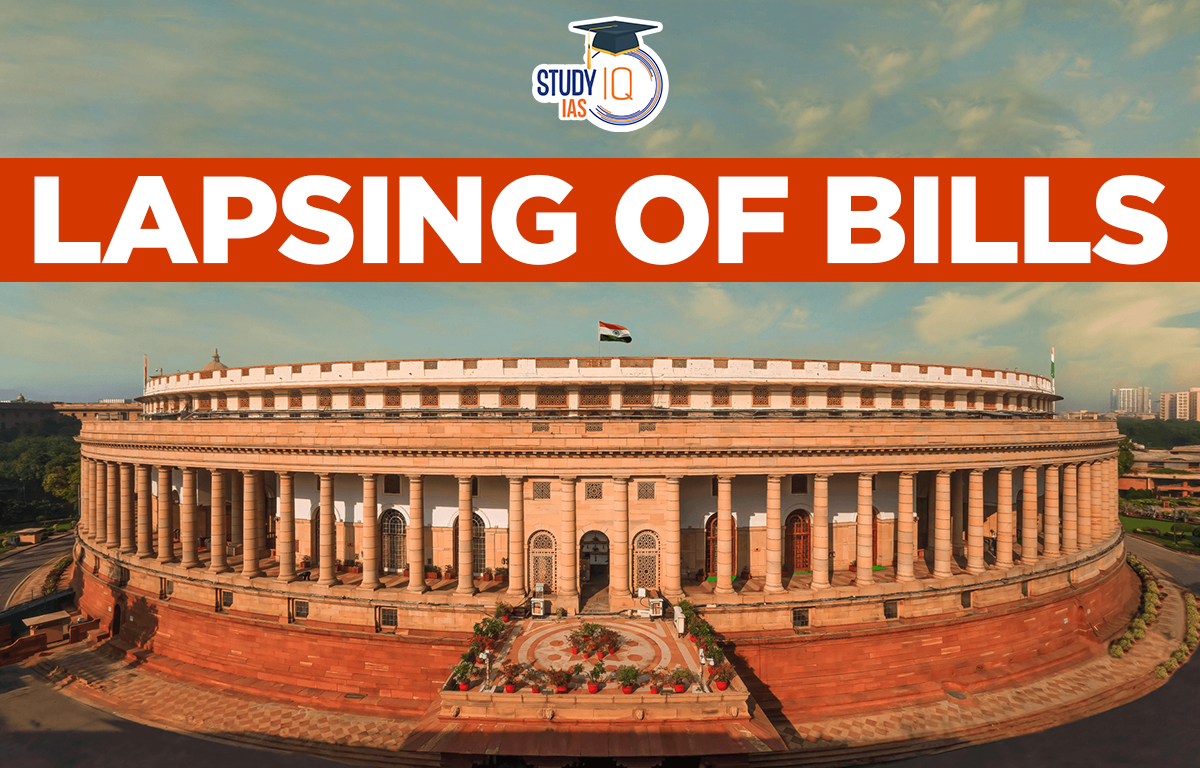Table of Contents
Lapsing of Bills
A bill is a proposal for new legislation (in the legislature). The Lapsing of Bills is the process through which a measure is abandoned in the legislature before it is passed into law. The reasons why a bill expires as well as the situations in which it does not are covered in length in this article. The issues raised by the topic are also highlighted in this article. The Lapsing of a Bills is an important part of Indian Polity which an important subject in UPSC Syllabus. Students can also go for UPSC Mock Test to get more accuracy in their preparations.
Understand the meaning of Lapsing of Bills
Every legislative proposal is submitted in the form of a Bill, which is legislation that has been written but does not become law until it receives the President’s approval. In general, the legislature is the government’s law-making body. The Bill must go through three readings in both the Rajya Sabha (Upper House) and the Lok Sabha (Lower House) before being presented to the President of the nation. There are three readings:
- The second reading of the bill includes a debate of its sections and concepts.
- The first reading, which is the introduction of the measure in the House.
- The third reading’s main topic is the debate over Bill’s motion.
Similar procedures are used in the State Legislature. After these readings, the Lower House of Parliament—where the Bill first started—sends it to the Upper House of Parliament. Here is where the idea of “lapse of a Bill” is relevant. One of two things can cause a legislative bill to expire:
- When a Bill is in the Lok Sabha and is awaiting passage into the Rajya Sabha;
- When a Bill is in the Rajya Sabha and has been passed by the Lok Sabha.
In either case, the Bill dies in the Indian Parliament, delaying the process of getting the President’s approval and turning into an Act, or otherwise becoming the law of the land. This article explores the causes of lapsing of bills and throws light on the issue of lapsed bills that subsequently end up costing the Union and the State Legislature.
Lapsing of Bills Rules
Although they are completely different, Rule of Lapse and “Lapsing of Bills” are sometimes confused. Parliament adheres to the annuity rule while approving the annual budget. Accordingly, the funding provided to the government under the budget is for a single fiscal year.
The remaining funds are credited back to the Consolidated Fund of India if the authorized funds are not expended within the allotted year. The ‘Rule of Lapse’ is the name of this rule. Rule of Lapse ensures that the Parliament (Legislature) effectively controls the government’s (Executive) finances.
Reason for Lapsing of Bills
A bill lapses in the Indian Parliament mainly due to the dissolution of the Lok Sabha (the Lower House) or the State Legislative Assembly. The Rajya Sabha (the Upper House) and the Legislative Council do not dissolve.
Union Legislature (Lok Sabha and Rajya Sabha)
According to Article 107 of the Indian Constitution:
- A bill must be passed by both Houses to be considered approved.
- A bill pending in Parliament does not lapse if the Houses are prorogued.
- A bill pending in the Rajya Sabha does not lapse if the Lok Sabha dissolves.
- A bill pending in the Lok Sabha lapses if the Lok Sabha is dissolved.
Important points about lapsing:
- A bill from the Lok Sabha lapses if it’s pending in the Rajya Sabha.
- A bill from the Rajya Sabha lapses if it’s pending in the Lok Sabha.
- If a bill is returned by the Lok Sabha to the Rajya Sabha after amendments and is still pending when the Lok Sabha dissolves, it lapses.
If a bill lapses, the government can choose to reintroduce it.
State Legislature (Legislative Assembly and Legislative Council)
According to Article 196:
- Any bill pending in the Legislative Assembly lapses, whether it originated there or was sent from the Legislative Council.
- A bill passed by the Legislative Assembly but pending in the Legislative Council also lapses.
Circumstances Under Which a Bill in the Indian Parliament does not lapsw
A bill in the Indian Parliament will not lapse in the following situations:
- If a bill is pending in the Rajya Sabha and hasn’t been passed by the Lok Sabha, it doesn’t lapse.
- If the President informs Parliament about a joint sitting before the Lok Sabha dissolves, the bill remains active.
- If a bill has been passed by both Houses but is still awaiting the President’s approval, it does not lapse.
- If the President returns a bill for the Rajya Sabha to reconsider, it remains active.
- Bills pending with Parliamentary Committees do not lapse when the Lok Sabha dissolves.
In State Legislatures, a bill will not lapse if:
- It is pending in the Legislative Council but not yet passed by the Legislative Assembly.
- It has been passed by both Houses but is still awaiting the President’s approval.
- It is pending approval from either the Governor or the President after being passed by one or both Houses.
- If it has been sent back by the President for reconsideration, it does not lapse.
Lapsing of a Bills Consequences
After the 16th Lok Sabha ended, several bills lapsed, including the Trafficking of Persons Bill, the Aadhaar Amendment Bill, the Triple Talaq Bills, and the Citizenship Amendment Bill. Notably, the Indian Medical Council Amendment Bill has been pending for over 32 years. These bills aimed at socio-economic development but ended up being a disadvantage for the country.
The consequences of lapsing bills include:
- Wasting Lok Sabha’s time.
- Showing the Parliament’s declining efficiency.
- Reducing the productivity of Parliament.
To address these issues, suggestions include:
- Improving Parliamentarians’ productivity to use their time effectively.
- Streamlining the process for passing bills and addressing any presidential returns quickly.
- Vice President M. V. Naidu proposed that if a bill isn’t cleared in the Rajya Sabha within five years, it should lapse automatically to help the Parliament function better.
Conclusion
The issue of bills lapsing is a persistent concern in Indian governance, especially after the dissolution of the 16th Lok Sabha. Out of fifty-five government bills pending in the Rajya Sabha, twenty-two lapsed. Vice President M. Venkaiah Naidu highlighted the significant time and effort needed to pass bills, emphasizing the need to address lapsing issues to improve Parliament’s efficiency. As important public welfare bills continue to lapse, it’s crucial for the government to find solutions to prevent this and ensure smoother legislative processes.
Lapsing of a Bills UPSC
The topic of a bill expiring is not new, but it continues to be heavily debated due to the impact it has on the Indian government’s legislative body. It should be noted that twenty-two of the fifty-five government bills still pending in the Rajya Sabha as of the dissolution of the 16th Lok Sabha session had expired. Students can read all the details related to UPSC by visiting the official website of StudyIQ UPSC Online Coaching.


 Indian Councils Act 1861, History, Provi...
Indian Councils Act 1861, History, Provi...
 NITI Aayog Report on India’s Hand and ...
NITI Aayog Report on India’s Hand and ...
 9th Schedule of Indian Constitution: His...
9th Schedule of Indian Constitution: His...





















